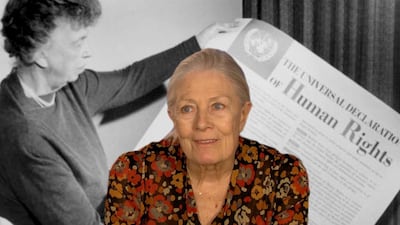At the age of 80, veteran British actress Vanessa Redgrave has turned her hand to directing a film for the first time.
For her debut, she chose a documentary about the refugee crisis, in which the personal and the political are intimately intertwined.
Sea Sorrow, which had its premiere in Cannes last week, links Redgrave's experience as a child evacuee during the Second World War to the plight of the huge number of displaced people fleeing conflicts now.
While the Oscar-winner was afforded comfort in her hour of need, at a relative’s house in Herefordshire, England, those making the hazardous trip to Europe from the Middle East often face obstruction, detention and deportation – if they survive the journey.
The war was a defining moment for Redgrave. Even when she was as young as 4, she says she thought: “What can I do to help?”
Together with a fellow evacuee, a 6-year-old boy who was also staying in the home of her mother’s cousin, she put on plays “for the sailors [her father, Michael, was in the merchant navy] trying to bring food during the war” to raise money – charging half-a-penny for admission.
“Being prepared to be killed to try to get food in to feed people is saving life, and we wanted to help people save lives. And I’ve basically wanted to do that my whole life,” she says.
More than 70 years later, she watched as upheaval in the region sparked a growing refugee crisis.
“I was one of those that rejoiced in the Arab Spring,” says Redgrave, “and I have always been very conscious of the huge powers behind dictatorships and oppressive regimes.
“But I knew trouble was coming, because there were so many powers that were coming and going: ‘Here we are. We’re so glad to see you all, after the Arab Spring’. When I saw David Cameron going to Cairo, I thought: ‘Oh my God. Trouble’.”
Redgrave “donated money and things” as the crisis deepened, and staged a theatrical production to raise money for the British Refugee Council.
She was moved to start work on her documentary after seeing the shocking photograph of 3-year-old Syrian Aylan Kurdi dead on a beach – “this little baby lying face down, on the edge of the water in Bodrom”.
Aylan and his family were in a dinghy that capsized, killing him, his mother and his sister. His father survived.
A playwright friend of Redgrave, Martin Sherman, who appears in her film, told her he had made the same two-kilometre journey that the Kurdis had been making – from Bodrom to Kos – on a commercial ferry.
“I thought, ‘My God, that family got into a rubber dinghy – they should have been given free tickets [for] a ferry’,” she says, thumping the table in anger. “So why weren’t they given free tickets? You know, ‘Come aboard, we’ll help you escape from the war’.
“Their city [Kobani] had been under siege by ISIL. They were trying to save their children’s lives to give them a future.”
Her outrage at the needless deaths ignited her desire to draw attention to the plight of such refugees.
“I’m very primitive in my mind,” she says.
“So I think, ‘Who is responsible for their deaths? Those who refused to give them the legal tickets ... to cross – European governments’.”
The documentary shows this is nothing new. In the 1930s, governments, including Britain’s, closed the door to Jews fleeing Nazi persecution. They got away with it, says Redgrave, because they kept the truth from the public.
“Brave correspondents were trying get across the horrors from the beginning,” she says. “But a wall went up around Britain because the British government didn’t want it to be known.”
In 1948, the formulation of the Universal Declaration of Human Rights, and later conventions, should have prevented the kind of human catastrophe the world is witnessing.
Redgrave recalls listening to its announcement on the radio.
“It was very vivid, but there was a scene which was to do with no torture, and that made my hair stand on end,” she says.
Governments now are falling short of the convention's principles, Sea Sorrow suggests, and even breaking international laws in their treatment of refugees. It shows people power can make a difference, though, and Redgrave hopes her film might be part of that.
“I hope being chosen for Cannes is a big help and more people will come and see it,” she says, adding that change has got to be “based in help, not hope – because when people help, they create a new situation, a new field of energy”.
artslife@thenational.ae

